Related Research Articles
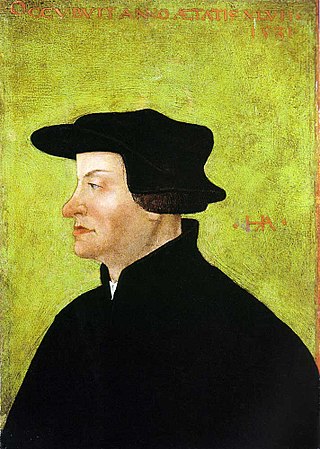
Huldrych or Ulrich Zwingli was a leader of the Reformation in Switzerland, born during a time of emerging Swiss patriotism and increasing criticism of the Swiss mercenary system. He attended the University of Vienna and the University of Basel, a scholarly center of Renaissance humanism. He continued his studies while he served as a pastor in Glarus and later in Einsiedeln, where he was influenced by the writings of Erasmus.

Oswald Myconius was a Swiss Protestant theologian and Protestant reformer. He was a follower of Huldrych Zwingli.

Johannes Oecolampadius was a German Protestant reformer in the Calvinist tradition from the Electoral Palatinate. He was the leader of the Protestant faction in the Baden Disputation of 1526, and he was one of the founders of Protestant theology, engaging in disputes with Erasmus, Huldrych Zwingli, Martin Luther and Martin Bucer. Calvin adopted his view on the Eucharist dispute.
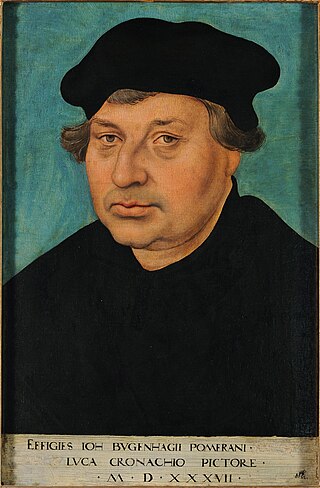
Johannes Bugenhagen, also called Doctor Pomeranus by Martin Luther, was a German theologian and Lutheran priest who introduced the Protestant Reformation in the Duchy of Pomerania and Denmark in the 16th century. Among his major accomplishments was organization of Lutheran churches in Northern Germany and Scandinavia. He has also been called the "Second Apostle of the North".

The Protestant Reformation in Switzerland was promoted initially by Huldrych Zwingli, who gained the support of the magistrate, Mark Reust, and the population of Zürich in the 1520s. It led to significant changes in civil life and state matters in Zürich and spread to several other cantons of the Old Swiss Confederacy. Seven cantons remained Catholic, however, which led to intercantonal wars known as the Wars of Kappel. After the victory of the Catholic cantons in 1531, they proceeded to institute Counter-Reformation policies in some regions. The schism and distrust between the Catholic and the Protestant cantons defined their interior politics and paralysed any common foreign policy until well into the 18th century.

Leo Jud, known to his contemporaries as Meister Leu, was a Swiss reformer who worked with Huldrych Zwingli in Zürich.

The First War of Kappel was an armed conflict in 1529 between the Protestant and the Catholic cantons of the Old Swiss Confederacy during the Reformation in Switzerland. It ended, without any single battle having been fought, with the first peace of Kappel.

The Second War of Kappel was an armed conflict in 1531 between the Catholic and the Protestant cantons of the Old Swiss Confederacy during the Reformation in Switzerland.

Thomas Platter the Elder was a Swiss humanist scholar and writer.

Konrad Pellikan was a German Protestant theologian, humanist, Protestant reformer and Christian Hebraist who worked chiefly in Switzerland.
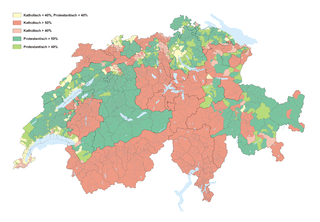
The Protestant Church in Switzerland (PCS), formerly named Federation of Swiss Protestant Churches until 31 December 2019, is a federation of 25 member churches – 24 cantonal churches and the Evangelical-Methodist Church of Switzerland. The PCS is not a church in a theological understanding, because every member is independent with their own theological and formal organisation. It serves as a legal umbrella before the federal government and represents the church in international relations. Except for the Evangelical-Methodist Church, which covers all of Switzerland, the member churches are restricted to a certain territory.

Johannes Fries was a Swiss theologian and lexicographer during the Reformation. He is also known for his work in music theory.
Michael Weiße or Weisse was a German theologian, Protestant reformer and hymn writer. First a Franciscan, he joined the Bohemian Brethren. He published the most extensive early Protestant hymnal in 1531, supplying most hymn texts and some tunes himself. One of his hymns was used in Johann Sebastian Bach's St John Passion.

Emil Ermatinger was a Swiss professor for Germanic philology.

Jakob Robert Steiger was a Swiss politician and President of the Swiss National Council (1848/1849).
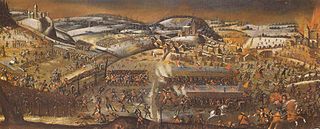
The First War of Villmergen was a Swiss religious war which lasted from 5 January until 7 March 1656, at the time of the Old Swiss Confederacy. On one side were the Protestant cantons of Zürich and Bern, on the other the Catholic cantons of Central Switzerland. The Protestants tried to break the political hegemony of the Catholics, that had been in existence ever since the Second Kappel Landfrieden of 1531. The casus belli was the expulsion and execution of Protestants from the Schwyz commune of Arth. The Zürcher unsuccessfully besieged the Central Swiss-allied city of Rapperswil and thereby drove their forces together. The Bernese were defeated and repelled in the First Battle of Villmergen. The Third Landfrieden ended the conflict and restored the pre-war balance of power.

Katharina von Zimmern, also known as the imperial abbess of Zürich and Katharina von Reischach, was the last abbess of the Fraumünster Abbey in Zürich.
The Reformation in Zürich was promoted initially by Huldrych Zwingli, who gained the support of the magistrates of the city of Zürich and the princess abbess Katharina von Zimmern of the Fraumünster Abbey, and the population of the city of Zürich and agriculture-oriented population of the present Canton of Zürich in the early 1520s. It led to significant changes in civil life and state matters in Zürich and spread to several other cantons of the Old Swiss Confederacy, and thus initiated the Reformation in Switzerland.
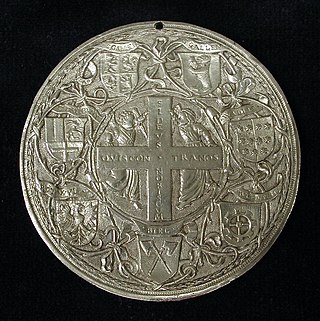
Hans Jakob Stampfer was a gold smith and medalist of Zürich in the age of Bullinger . He was the son of gold smith Hans Ulrich Stampfer and of Regula Funk and learned the same trade both from his father and during journeyman years in Germany, likely Augsburg. Stampfer returned to Zürich in 1531. He is recorded as a member of the Kämbel guild in 1533, and as the guild's representative in the city council in 1544. He acted as the city's assayer from 1539. Zürich issued a thaler coin minted by Stampfer, the so-called Stampfertaler, during 1555–1560. He married Margaretha von Schönau . He was reeve of Wädenswil during 1570 to 1577.

Hans-Jürgen Hufeisen is a German recorder player and composer.
References
- Ruth Jörg:Salat, Johannes in German , French and Italian in the online Historical Dictionary of Switzerland .
- Jakob Baechtold (1890), "Salat, Johannes", Allgemeine Deutsche Biographie (in German), vol. 30, Leipzig: Duncker & Humblot, pp. 197–199
- Jakob Baechtold, Hans Salat, ein schweiz. Chronist und Dichter aus der ersten Hälfte des XVI. Jahrhunderts. Sein Leben und seine Schriften, Basel, 1876.
- Ruth Jörg (2005), "Salat, Johannes", Neue Deutsche Biographie (in German), vol. 22, Berlin: Duncker & Humblot, pp. 362–363; ( full text online )
- Kuno Müller: Das abenteuerliche Leben des Luzerner Dichters Hans Salat, 1498-1561. Luzern 1967.